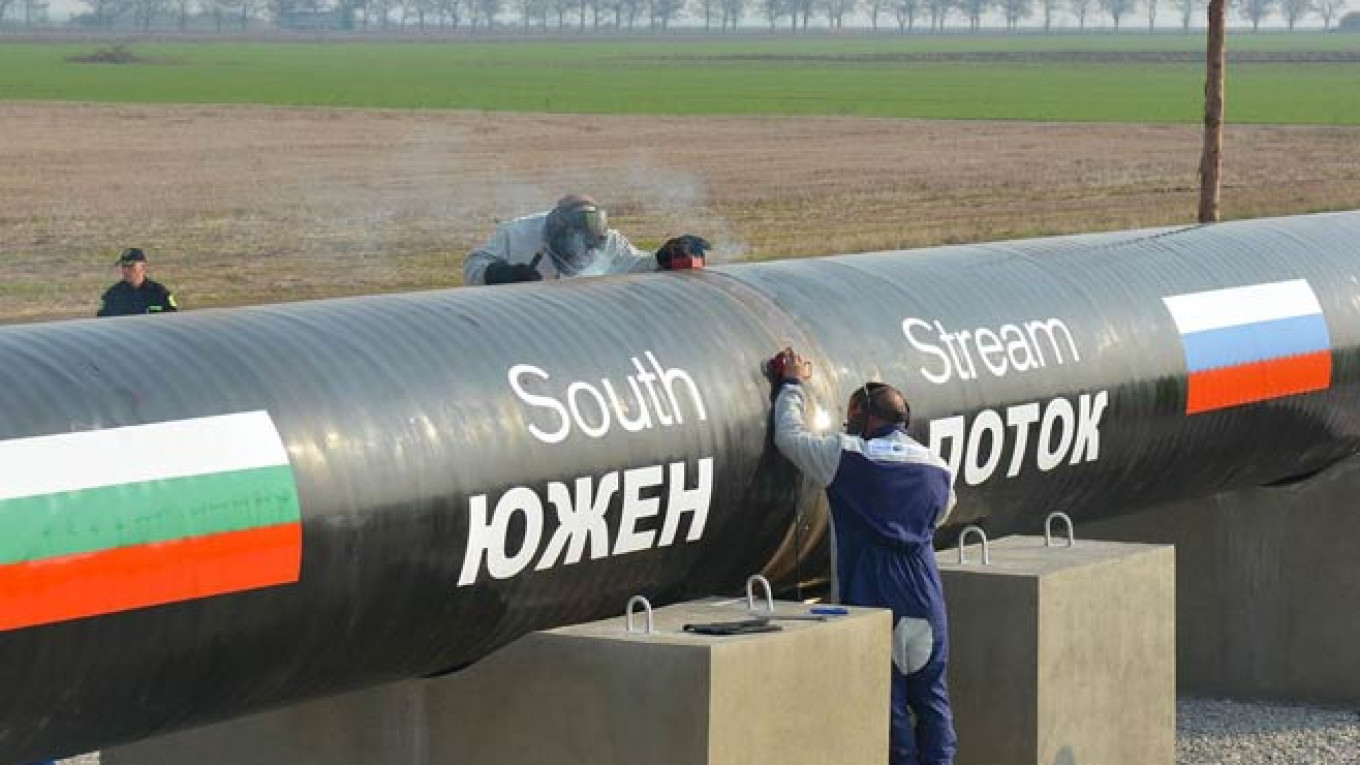As the EU presses on with sanctions against Russia for seizing Crimea, the $50 billion South Stream pipeline, meant to bring Russian gas through the Black Sea to Europe, may be frozen in favor of other projects.
The European Union is close to freezing the progress of South Stream and has warned Bulgaria, the first country the pipeline would have a link to in Europe, to be very careful and not to interfere with the EU's new toughened position on the pipeline, said European Commission chief Jose Manuel Barroso, The Daily Telegraph reported Tuesday.
On Thursday, Bulgarian Foreign Minister Kristian Vigenin said in an interview with Reuters that while the standoff between the West and Russia over Ukraine may temporarily disrupt realization of the South Stream gas pipeline, there is no threat to it in the long run.
"Well, generally nobody is putting the project under question, but of course in a time when political relations become more complicated this may affect the speed with which the solutions are to be found," Vigenin said.
While South Stream is still far from receiving all the necessary permits to operate across EU, Guenther Oettinger, the European Commissioner for Energy, earlier said that discussions with Russia on the link were suspended.
South Stream pipeline will transport gas from Russia's Yamal peninsula in the north, across the country to the Black Sea and underneath it to Eastern Europe, bypassing Ukraine.
With a full design capacity projected at 63 billion cubic meters per year, it aims to supply 15 percent of Europe's gas by the end of 2018. Delivery of the first 15 billion cubic meters of gas per year is slated to start already by the end of 2015.
Now, with the standoff over Ukraine, Europe may consider other alternatives. A priority may be switched to gas supplies from Azerbaijan's Shah Deniz gas field, Rosbalt news agency said Tuesday, citing European Commission's Barroso.
But this one gas field will not be enough to meet European demand, said Mikhail Krutikhin, a partner and analyst at consulting firm RusEnergy.
Azerbaijan can supply about 10 billion cubic meters of gas per year, which will clearly not cover up for the South Stream, Krutikhin said, adding that other alternatives, if combined, could create a rival to the widely discussed pipeline.
"Iran is increasing the capacity of its pipelines. It is able to transport 10 billion cubic meters of gas per year to Turkey today and this could be boosted to 20 billion cubic meters and re-exported to Europe," Krutikhin said.
Among other alternatives, he named the Iraqi Kurdistan zone that could supply up to 30 billion cubic meters of gas per year and excess gas from Israel and Cyprus, which could together provide another 12 billion cubic meters.
"If Turkey agrees to become a transit corridor for all this gas, it could fill the Trans Adriatic Pipeline going through Albania to Italy or there could be a return to the Nabucco West project which aimed to transport gas through Turkey to Bulgaria and Romania toward Austria," Krutikhin said.
Nabucco West was abandoned in 2013 because it lacked gas to fill it to design capacity and it was labelled too expensive and lost support from main stakeholders.
At the same time both Nabucco and Trans Adriatic Pipeline would be economically competitive with South Stream, Krutikhin said, because with a price tag of more than $50 billion for all of its sections it is a "very expensive project that is unlikely to pay off."
South Stream's offshore part under the Black Sea is planned to be built by a consortium of international oil and gas companies led by state-owned Gazprom. Other participants are Italy's Eni, France's EDF and Germany's Wintershall. And most of them so far have voiced their support of the project.
A spokesman for Eni said, citing the company CEO Paolo Scaroni, that "South Stream is a very important project from a commercial point of view and we ought to be in favor of it to avoid the risks of transit [of gas] through Ukraine."
Wintershall agreed that the pipeline will ensure security of gas supplies to the EU and also voiced support for the project.
"Construction of the pipeline is on schedule. We are operating on the assumption that the applications required continue to be duly processed by the authorities responsible," the company said in a statement.
EDF could not provide immediate comment for this publication.
Contact the author at [email protected]
A Message from The Moscow Times:
Dear readers,
We are facing unprecedented challenges. Russia's Prosecutor General's Office has designated The Moscow Times as an "undesirable" organization, criminalizing our work and putting our staff at risk of prosecution. This follows our earlier unjust labeling as a "foreign agent."
These actions are direct attempts to silence independent journalism in Russia. The authorities claim our work "discredits the decisions of the Russian leadership." We see things differently: we strive to provide accurate, unbiased reporting on Russia.
We, the journalists of The Moscow Times, refuse to be silenced. But to continue our work, we need your help.
Your support, no matter how small, makes a world of difference. If you can, please support us monthly starting from just $2. It's quick to set up, and every contribution makes a significant impact.
By supporting The Moscow Times, you're defending open, independent journalism in the face of repression. Thank you for standing with us.
Remind me later.






